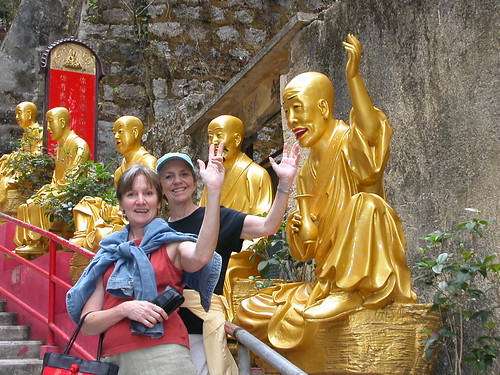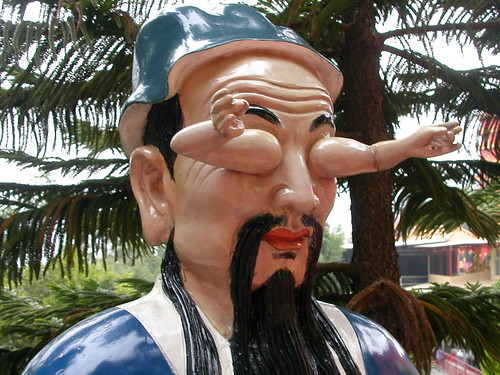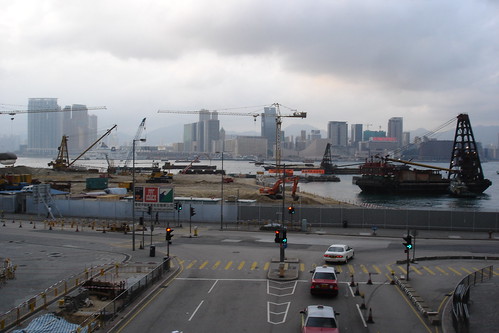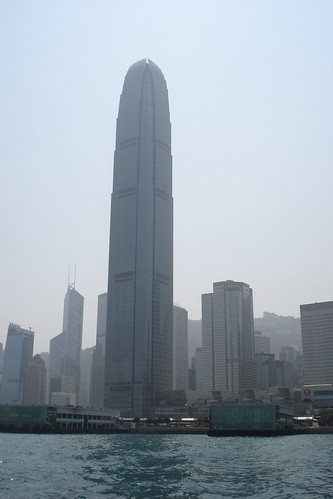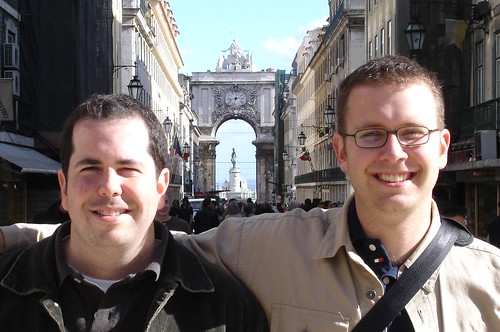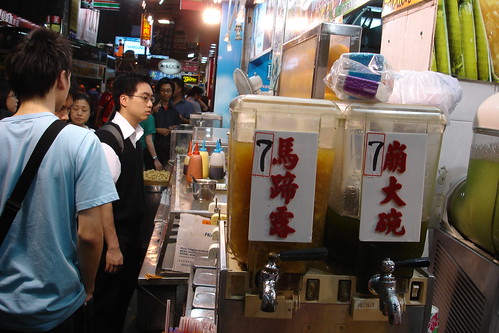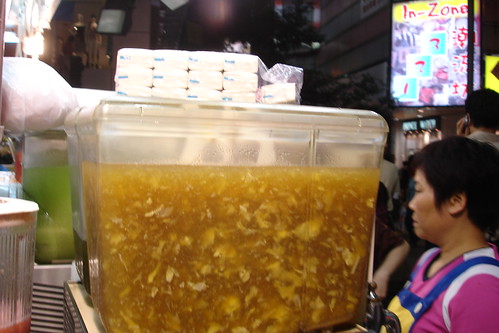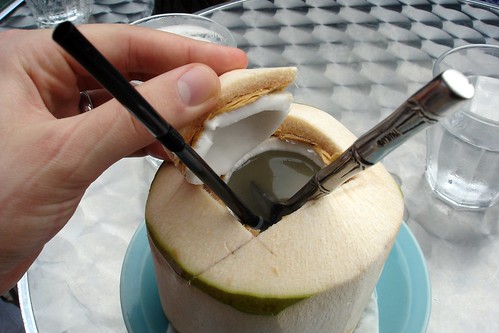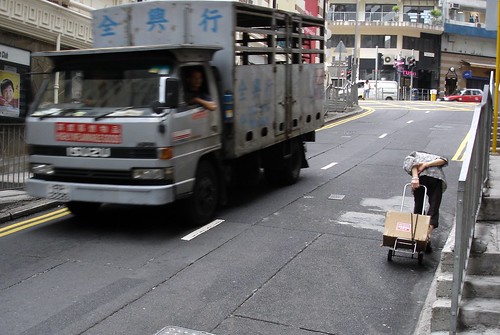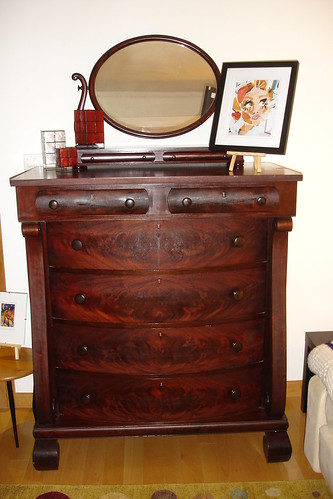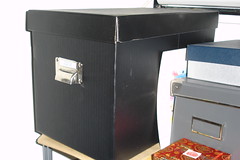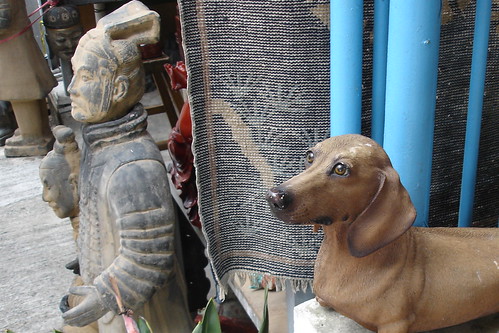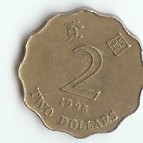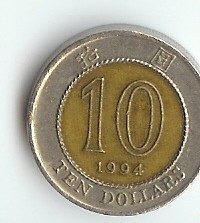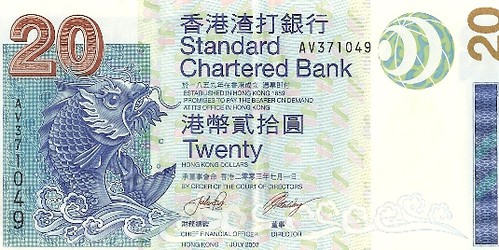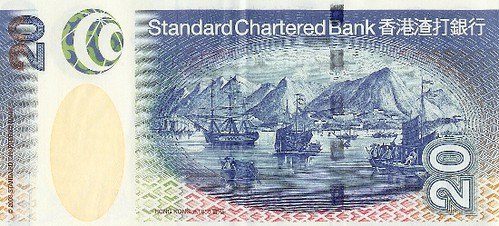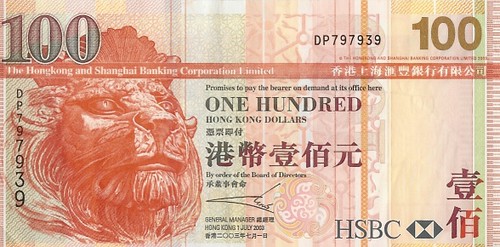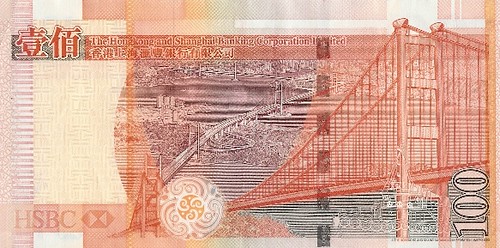It turns out they were 32:1, actually. Those were the odds of my winning horse on Wednesday night. I don't know its name; all I know is he was number 4. I walked up to the betting counter and randomly picked #4 to win. HK$50. It was a silly bet I thought. I could have bet just $20. I was going to lose it.
But I didn't. Miraculously my unnamed horse won. It led early and led late. It was the leader. I couldn't believe it. I was so excited, and yet, there was no one with which I could share my joy or confirm my incredible luckiness. Everyone around me was speaking Chinese. Most were fairly gruff men, some women, all serious. This betting stuff was not something that seemed to be an idle affair for any of my neighbors. They had their newspapers out, folded, folded again, circled, crossed out, and in every way, used. Used betting tickets were folded over twice and discarded with disgust under the seats opposite me. Hurled at the floor to pay for their unpaying ways.
I was at the Happy Valley Racecourse, one of Hong Kong's most important race tracks. Since we have arrived I had been wanting to come to the course as it seemed such an anomaly. It is absolutely enormous, and it sits right smack dab in the center of one of Hong Kong's busiest areas. Ringed by buildings that seem to stand permanently in some sort of salute to its grandeur, the racecourse has been for me a bit of a mystery. Racing in Hong Kong is a bit of a historical tradition, stemming, I believe, from colonial days, but today, the races are very much a Hong Kong mainstay. 98% or so of the people that I saw at the races were Chinese and about 2% expatriots. The area where I was able to buy a ticket for on the street seemed to be for general admission although this was not what it was called. I arrived about 5 minutes after the first race had been run and already the place was packed. For about an hour I didn't see anyone that was non-Chinese and settled in for some good observation.
You entered the racetrack through a narrow turnstyle. The cost of admission HK$20 (US$2.5). Immediately I came to a bank of elevators and was whisked away by myself to the 4th floor. In Hong Kong, the 4th floor is really the 5th floor by U.S. standards as there is a ground floor and a 1st floor. The elevators were fairly nice, with gold highlights and some marble-like features. The only indicator of the slightly rough nature of the track was on the ceiling of the car, where something or someone had really scratched things up. It was as if a bull had prepared for a charge using the ceiling tiles to secure his footing. The 4th floor was clean and appeared long as I entered. The tile and decorations were more ceramic and plastic, which was actually a welcome change of pace. It somehow seemed like a place you could really let go unlike most places of relaxation in Hong Kong which are so glitz and glamour as to feel more fairy talish. Immediately upon entering the room I was propositioned by one of the attendants to take a survey. As it was all in Chinese, she translated for me, pulling every English word she could think of out of her purple-stewardess-esc suit. The logic of the interview was misplaced unless she didn't realize I had just stepped off of the elevator for all the questions were about my betting habits and activities thus far. Oh well. As a researcher I still felt like I needed to answer.
The windows to the track fell across the left side of the room, taking up about half of the wall. The sky had finally begun to unleash its contents on the people of Hong Kong a few minutes before the race and was doing so again by the 2nd race. The steam it created made for somewhat cloudy window views but still the track glowed a white ring of green titled on the horizon. I sat towards the windows on a banana yellow bench. The benches ran the length of the room and were precisely situated in their placements, allowing for three or so people to occupy each side of a bench. The occupants of the benches changed often, normally only lasting the span of a single race - every thirty minutes. The funny part about the non-musical musical chairs was that each time people switched spots, their stuff stayed and accumulated, untouched. I think there was a fear of disruption, of being accused of stealing things, or of throwing anything away. There were an odd number of large, filled manilla envelopes which men carried and some had discarded. I never determined if these were for the races or just random coincidence.
Down the middle of the room ran a series of quasi lounges created by the placement of TV monitors for viewing of the horses and the odds for the different races. Some lounges had only empty places for standing, which was the most common means of watching the race. Others had chairs, kind of late 1970's plastic bucket-like school seats. On the right side of the room was where all the betting took place. There were machines for the regulars, those that had registered with the Hong Kong Jockey Club, the organization that oversees all the racing in Hong Kong. These machines appeared to be dumbed down ATMs, actually they took ATM cards, but they sounded more like old fashioned time machines - the kind that one would clock in and out on on. Their moaning printing could be heard throughout the cavernous space. The peopled windows stood next in line and were but a few in number - I believe three. At the end of the space, opposite where I entered, there was snack bar which had an assortment of modern Chinese options, mostly pastries filled with meat and a few noodle choices. I had an iced coffee, which was the best I have had in Hong Kong and an oddity for you don't see iced drinks here except at Western chains.
Just at the ends of both sides of the room were patio-like doors that led to a small outside area that was sheltered from above but open to the front. This seemed a popular place on a night like I saw it, and perhaps it was always popular as it appeared to be no smoking inside and smoking allowed outside. From these spots you could see the good seats, or more aptly the good areas. These places were more ballroom-esc than seat laden. This was were most of the expats appeared to be, dressed well and focused mostly on socializing.
I was surprised at the variety of ages and gender that I found at the races. It was not something for the old, the young, the pretty, the ugly, the rich, or the poor, it just was. More than any other activity in Hong Kong, this just appeared to be for everyone. I liked that.
I came out a winner after the 5th race, having only placed one other bet, this time on a horse that came in dead last - actually I don't think it even finished. It must have gotten an injury as it seemed to fade into racing oblivion. While I enjoyed leaving that night with a couple of hundred dollars burning a whole in my pocket, I was most pleased with the experience of the races. It was not any easy thing to get there. Information for tourists on the races is really lacking. Websites are horrible and there are almost no signs in English, but I made it. I was successful, and able to walk off like a cowboy without a horse into the haloed light that must have enveloped me as I was backlit against the track.
